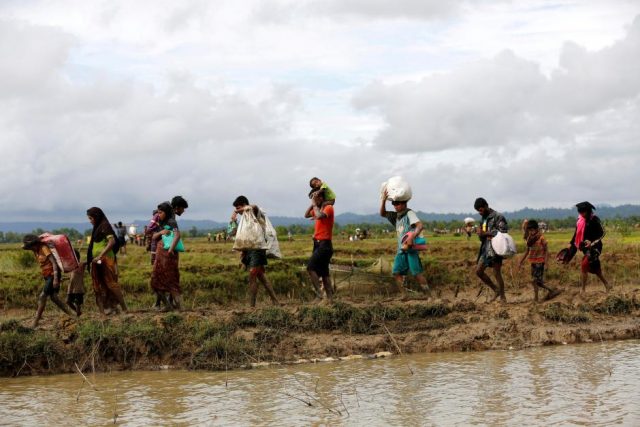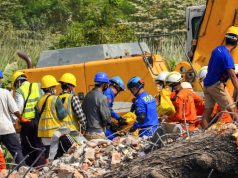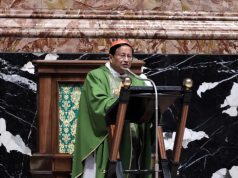MANILA, Philippines — Defense ministers of Association of Southeast Asian Nations member-states have voiced concern Rohingya refugees fleeing Myanmar may be recruited by terrorists and have urged the country to do more about the matter, Defense Secretary Delfin Lorenzana said.
Speaking at the “ASEAN Leadership Amid a New World Order” forum hosted by the Stratbase Albert del Rosario Institute-at the Makati Shangri-La on Wednesday, Lorenzana said the matter was among several concerns raised during the ASEAN Defense Ministers’ Meeting and ADMM-Plus — which includes defense ministers from Australia, China, India, Japan, New Zealand, Republic of Korea, Russia, and United States — that he hosted about two weeks ago.
Participants to the ADMM discussed terrorism and refugees, as well as climate change, natural disasters, piracy, illegal drugs, and the South China Sea.
The ADMM-Plus, on the other hand, was more anxious about North Korea.
600,000 Rohingya have fled from Rakhine state to Bangladesh since insurgents from the minority group struck in August, according to Reuters. Lorenzana said some 200,000 more were driven to Malaysia while others are in Thailand and Saudi Arabia.
Myanmar refuses to recognize the mainly Muslim minority group as citizens.
The United Nations said Myanmar’s crackdown following the August attacks appeared to be ethnic cleansing. But Myanmar maintains it is fighting “terrorists” who have killed civilians and burnt villages.
(Read more: http://www.interaksyon.com/u-n-fears-further-exodus-of-rohingya-from-myanmar/.)
“According to the defense minister of Myanmar (Sein Win), they are not actually trying to drive these people away, but are just trying to prevent the influx of other people coming from Bangladesh,” Lorenzana said.
“The consensus was for Myanmar to do more to resolve these issues,” he said. “Because ASEAN says that the concern of ASEAN is that these refugees might find their way into some terrorist camps and train, and then they will train the other camps in the region, and it will become a problem.”
Reuters has reported the UN as saying “trafficking networks already exist in southern Bangladesh’s sprawling camps.”
“Six out of ten of the new arrivals in the Bangladesh camps are children, providing a fertile hunting ground for traffickers looking for young girls to recruit as maids,” Reuters said.
“We are telling all the people that there are kidnappers here, so be careful with your children,” refugee Nazir Ahmed was quoted as saying in the report.
Ahmed, who stays at a refugee camp, has “set up an information center two months ago, which he said has already reunited some 1,800 lost children with their parents,” the report said.
Meanwhile, Lorenzana also reflected on the recently concluded fighting in Marawi, calling it “an eye-opener for all of us.”
“Marawi showed us in the defense department how woefully inadequate our capabilities are to face this kind of problem,” he said.
Though there had been indications terrorism had spread to the Philippines, “for the longest time I think the AFP had been in denial mode that they have access here until Marawi broke out,” Lorenzana said.
Over the past years, he said, defense officials have been in touch with their counterparts in the Middle East who are fighting the Islamic State, which had directed their fighters to return home. Home for these fighters include the Philippines, Malaysia, Thailand, Indonesia, and even Singapore.
The Middle Eastern officials had given names of these fighters to Filipino officials, “and we are very anxious to find out if they find their way back home,” Lorenzana said.
Touching on the fourth anniversary of supertyphoon Yolanda, he said ASEAN is all too familiar with climate change.
“There is also a looming problem” involving the five Mekong countries — or half of ASEAN — Myanmar, Laos, Thailand, Cambodia, and Vietnam. “The Himalayan plateau, which holds a lot of ice, is slowly melting,” Lorenzana said.
This is where the Mekong River gets most of its water. China has been building dams upstream, and some of the countries downstream are building the same. “You have the making of grave disasters in the future,” he said.
As early as 2010, Reuters reported that Thailand, Laos, Vietnam, and Cambodia were “affected by the Mekong’s biggest drop in water levels in half a century.”
As for concerns over North Korea, which has been conducting nuclear tests recently, Lorenzana called China “a big factor” in addressing this.
He recalled asking Chinese Ambassador Zhao Jianhua why they “can’t control North Korea.”
Zhao answered that “nobody can control North Korea,” as it is acting on its own.










